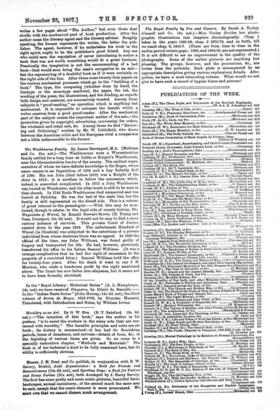The Washbourne Family. By James Davenport, M.A. (Methueu and Co.
21s. net.)—The Washbournes were a Worcestershire family settled for a long time at Little or Knight's Washbourno, near the Gloucestershire border of the county. The earliest repre- sentative of whom we have definite knowledge is Sir Roger, whose name occurs in an Inquisition of 1259 and a Lay Subsidy Roll of 1280. His son John (died before 1319) was a Knight of the shire in 1312: it is needless to follow the succession, which, indeed, is somewhat complicated. In 1615 a John Washbourne was buried at Winchester, and his altar-tomb is still to be seen in that church. In 1743 Ernle Washbourne died unmarried and was buried at Pytchley. He was the last of the male line, but the family is still represented on the distaff side. This is a volume of great interest to the genealogist.—With this may be mon- tioned, though it relates to the legal side of county history, The Wapentake of Wirral, by Ronald Stewart-Brown (H. Young and Sons, Liverpool, 10s. 6d. net). It would not be easy to find a more curious instance of survival. This private Court of Justice existed down to the year 1853. The unfortunate Hundred of Wirral (in Cheshire) was subjected to the extortions of a private individual from whose decisions there was no appeal. In 1829 the official of the time, one John Williams, was found guilty of forgery and transported for life. He had, however, previously transferred his office to his father, Samuel Williams. (It was a strange complication that he had the right of succession to the property of a convicted felon.) Samuel Williams held the office for twenty-four years. After his death it went to one J. H. Moreton, who made a handsome profit by the right mentioned above. The Court has now fallen into abeyance, but it seems not to have been formally abolished.


















































 Previous page
Previous page